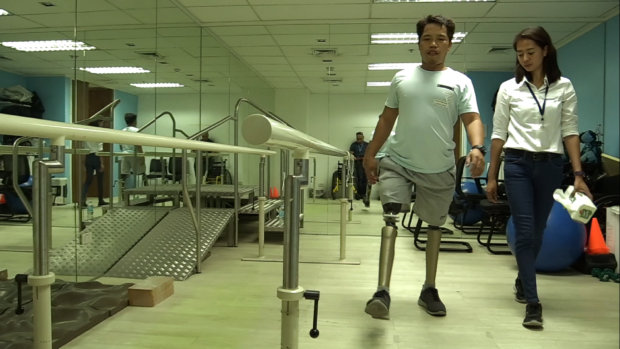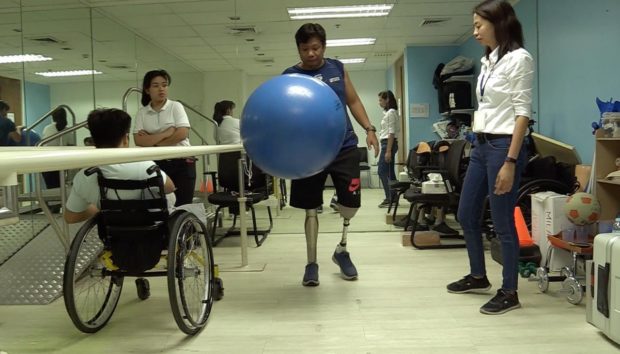‘High-tech legs’ spring hope for Army men who lost limbs in Marawi siege
MANILA, Philippines — The last two years have been a hurdle for T/Sgt. Michael dela Vega and Sgt. Renato Eucogco, whose lives have been forever changed because of the war in Marawi City.
An improvised explosive device blew off the limbs of the two soldiers from the 51st Infantry Battalion in August 2017. At that time, government forces were at the height of an armed combat with Islamic State-inspired fighters from Maute Group.
“When I regained my senses and felt my legs weren’t there, I knew then that this is the life that I’ve signed up for… This is part of our duty and we will face this head on,” said Dela Vega.
“So many things ran through my mind at that time. What happens to my family? What happens to my career? How do I survive? There were so many thoughts in my head and sometimes it just left me to tears,” said Eucogco.
Over 1,000 were killed in the months-long war waged by armed groups that wanted to establish a caliphate in Marawi City. Around 160 of the fatalities were soldiers.
Article continues after this advertisementBut Dela Vega and Eucogco are getting by and hopeful thanks to advanced science that makes high-tech artificial limbs available.
Article continues after this advertisement
T/Sgt. Michael dela Vega and Sgt. Renato Eucogco, whose lives have been forever changed after losing their limbs during the war in Marawi City, still look forward to a promising future thanks to their government-sponsored sophisticated artificial legs that offer them hope. RYAN LEAGOGO / INQUIRER.net
Currently, Dela Vega and Eucogco are on the road to recovery. They won’t have to be confined to wheelchairs for the rest of their lives as they were among 17 recipients of sophisticated prosthesis from Ottobock Philippines in late March.
Sourced from special funds from the Office of the President, the specialized artificial legs come with a six-year warranty that protects against potential defects or wear and tear.
Fitting for the prosthesis and physical training started late last year before the official turnover.
INQUIRER.net visited one of their therapy and rehabilitation sessions in Ortigas early May to observe the two soldiers’ progress.
For Dela Vega, there are drawbacks that remain with the new prosthesis but overall, it allows them to move easier and more naturally.
“The previous (manual) one, you have to be able to control it or else you’ll fall. This one only needs a combined effort. It responds when you shift weight so you can prevent a fall and you will be able to recover,” he explained.
RJ Amoyo, business development manager of Ottobock Philippines, said the built-in microprocessors powering the prosthetic legs have features for “additional safety” of users.
“It has features that mechanical ones don’t have. It has functions to help you out when you stand up, or sit down – it’s more controlled. If it’s a mechanical one, you’ll have to sit very slowly. And you have to use your hands to do it,” she said.
The ultimate goal for patients, she said, was to walk with their prosthesis with “free hands.” For now, she noted, Dela Vega and Eucogco’s motions are still limited since they are still undergoing therapy sessions.

T/Sgt. Michael dela Vega and Sgt. Renato Eucogco, whose lives have been forever changed after losing their limbs during the war in Marawi City, still look forward to a promising future thanks to their government-sponsored sophisticated artificial legs that offer them hope. RYAN LEAGOGO / INQUIRER.net
Although they are still adjusting to a life with artificial limbs, already the two soldiers could no longer think of a future without it.
Dela Vega said he wants to be assured they could keep their prosthesis for as long as they could – or better, for as long as they are alive.
“The warranty is only up to 6 years,” he noted. “They said if there are problems after 6 years, if it needs repair or we encounter any issues, we were told to go to V. Luna Hospital.”
“They said they will shoulder the costs after 6 years but of course we want to put it in writing,” Dela Vega also said.
Still, the two soldiers are grateful the government and Philippine Army have not neglected them.
“They have given more than enough support that we can ask for. If this happens to an ordinary person, this can be very costly. Financial-wise, they have given adequate assistance even for our family,” Eucogco said.
Once they have fully restored mobility, Dela Vega and Eucogco would return to work, according to the Philippine Army.
“There are tasks for us that suits our capabilities like office work. We can do it. We may not be in the battlefield but we can do admin matters. We’d like to continue being on duty because of the support shown by the government. Their full support is encouraging so we are ready,” Dela Vega said.
“The loss of our legs will not stop us. We can endure because we know the government will not leave us behind,” Eucogco said. “They gave all their support. If I give up, what happens to my children and to my family who are depending on me?”
While the war in Marawi City has altered their lives in ways more than they could have ever imagined, the two soldiers do not regret joining the Army.
“When we entered the service, we knew the dangers at hand. We may not have predicted that it will be something like this, like loss of limbs. We really didn’t think of that,” Dela Vega said. “(But) it already happened, so we have to accept it. My family did not give up on me so I will not give up on them. I will face this new life and I won’t look back to the past.”
“Why should I regret it? I always wanted to be a soldier. Nobody forced me to enter the service. When we went to training, I knew that our other foot is on the grave. It never crossed our minds to regret what happened. Such is the life of a soldier – you live or die,” Eucogco said. (Editor: Katherine Adraneda)